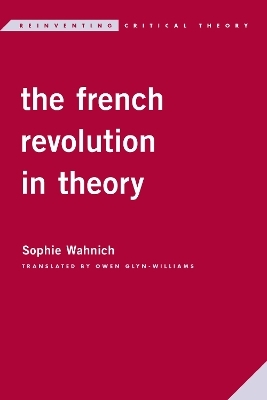
The French Revolution in Theory
Rowman & Littlefield International (Verlag)
978-1-78661-617-3 (ISBN)
More so than historians, it is philosophers that have played the leading role in the portrayal of this major event in French political history. The philosophical quarrels of the 1960s placed the French Revolution at the heart of their debates. The most well-documented among these is the conflict between Jean-Paul Sartre and Claude Lévi-Strauss and subsequently, Michel Foucault.
Do we need an ethics of the history of the French Revolution? Rancière, Derrida, Balibar, Lefort, Robin, and Loraux can help answer this question, in an epistemological approach to history. These successive explorations allow us to move away from a myth of identity and to rediscover a real Revolution, capable of offering Enlightenment and political utility and interrogating what democracy and emancipation mean for us today.
Sophie Wahnich is Director of research in History and Political Science at the National Research Institute (Centre national de recherche scientifique , CNRS), Director of the IIAC in the École des Hautes Études en Sciences sociales, France. A specialist of the French revolution trained in discourse analysis and political theory, Sophie Wahnich's work deals with disruptive historical events and their consequences for the political, social and emotional fabric of society.
Introduction – The French Revolution is Not a Myth: Sartre, Lévi-
Strauss, Foucault, Lacan and us
Part I
Chapter one – How did the French Revolution become a Sartrean object?
Chapter two – Working with historical details against the fetishizing of reality
Chapter three – Do not dissolve the real men of the French Revolution in a bath of sulfuric acid
Chapter four – Restoring the sacred to its place
Chapter five– Apocalypse and Fraternity-Terror
Chapter six – The question of dialectical time and the futility of the notion of rearguard
Part II
Chapter seven – Three humanities in one, Europeans, colonized, savages
Chapter eight – Conclude a book, conclude a discussion
Chapter nine – Michel Foucault and the French Revolution: a misunderstanding?
Chapter ten – The French Revolution in between archaeologies of knowledge, discourse formations, and social formations
Chapter eleven – Surrounding the Iranian revolution, retrieving the missed object with Foucault, in spite of Foucault
Chapter twelve – the French Revolution, matrix of totalitarianism, a strange enigma of a statement
Chapter thirteen – Sade and the folds of the ethics of the French Revolution
Conclusion – Dissipating layers of fog
| Erscheinungsdatum | 17.08.2020 |
|---|---|
| Übersetzer | Owen Glyn-Williams |
| Verlagsort | London |
| Sprache | englisch |
| Maße | 160 x 228 mm |
| Gewicht | 508 g |
| Themenwelt | Geisteswissenschaften ► Geschichte |
| Geisteswissenschaften ► Philosophie | |
| Sozialwissenschaften | |
| ISBN-10 | 1-78661-617-3 / 1786616173 |
| ISBN-13 | 978-1-78661-617-3 / 9781786616173 |
| Zustand | Neuware |
| Haben Sie eine Frage zum Produkt? |
aus dem Bereich


